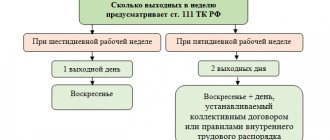Payment for work on weekends and holidays
Work on a weekend or a non-working holiday is paid at least double the amount:
- for piece workers - no less than double piece rates;
- employees whose work is paid at daily or hourly tariff rates - in the amount of at least double the daily or hourly tariff rate;
- employees receiving a salary due to the fact that their work is not standardized - in the amount of no less than a single daily (hourly) rate per day (hour) of work in excess of the salary, if work on a weekend or non-working holiday was carried out within the monthly working time norm , and in the amount of no less than double the daily or hourly rate for a day or hour of work in excess of salary, if the work was performed in excess of the monthly working hours.
Read in the berator “Practical Encyclopedia of an Accountant”
How do you get paid for working on weekends and holidays?
How to pay for work on days off if the employee receives a salary and bonus
Which is more profitable: double pay or time off?
The economic benefits for employees working on their day off and for the enterprise administration vary greatly.
For employee
If we consider compensation options from the employee’s point of view, then in most cases, receiving additional payment above the established monthly salary is more preferable.
This conclusion does not apply to situations where an employee, for personal reasons, would benefit from additional days of rest.
If several days off are accumulated, the employee will have the opportunity to use these days to solve his own problems, and those days off when he was called to work due to production needs will be paid as usual.
For the employer
For the employer, the situation looks different. To save the administration's wage fund, it is more profitable to postpone the day off to another time, since time off is not subject to payment.
If an employee used time off in the same month when he worked on an odd day, then the total amount of earnings for the month will not change. In a situation where time off will be granted in the next month, the salary must be reduced by the “cost” of additional days off.
Special insurance experience - what is it? Are you planning to fire a retiree? Find out whether it is possible to dismiss a person of retirement age at the initiative of the employer by reading our article.
A sample voluntary resignation letter can be found here.
When can you be hired to work on weekends and holidays?
You can invite an employee to work on weekends and holidays:
- to perform unforeseen work, on the urgent implementation of which the future normal operation of the organization as a whole, or an individual entrepreneur depends;
- to perform unforeseen work, on the urgent implementation of which the future normal operation of individual structural divisions or individual entrepreneurs depends.
To attract an employee to work on weekends and holidays, the written consent of the employee and the taken into account opinion of the elected trade union body (if any) is required.
There are exceptions.
Who is freed
Not all employees can be required to work on weekends. The categories of persons listed below have the right not to go to work on holidays and weekends, regardless of the employer’s requirements:
- pregnant women;
- parents raising a disabled child;
- parents of children under 5 years of age, but only in the case of a single-parent family;
- employees who have seriously ill relatives and care for them;
- workers who have not reached the age of majority.
An employer has the right to hire women with children under 3 years of age, as well as workers with disabilities only if they are not prohibited from doing so due to health reasons.
When the employee's consent is not required
Here are the cases when it is possible to be hired to work on weekends and holidays without the employee’s consent (Article 113 of the Labor Code of the Russian Federation):
- to prevent a disaster;
- to prevent a production accident;
- to eliminate the consequences of a disaster, industrial accident or natural disaster;
- to prevent accidents;
- to prevent destruction or damage to the employer’s property;
- to prevent destruction or damage to state or municipal property;
- to perform work the need for which is due to the introduction of martial law;
- to perform urgent work in emergency circumstances, that is, in the event of a disaster or threat of disaster (fires, floods, famine, earthquakes, epidemics or epizootics) and in other cases that threaten the life or normal living conditions of the entire population or part of it.
Step-by-step algorithm for registering an employee’s work on a day off
Olga Verbitskaya
So, step-by-step instructions for getting involved in work on a day off:
- The occurrence of unforeseen work , which may affect the normal functioning of the organization or individual entrepreneur, must be recorded by some kind of official document, for example: an internal memo from the head of a structural unit, a memo from an employee, etc., which determines the circle of employees who need to be involved in the work on weekends or non-working holidays.
- Based on the above document, written consent is obtained to be hired to work on a day off or a non-working holiday, and if work is carried out on a day off or a non-working holiday, it is necessary to involve women with children under 3 years of age, or disabled people from For these employees, it is necessary to obtain a document confirming the absence of medical contraindications, obtain consent to work on a day off or a non-working holiday, as well as a document confirming that this category of employees is familiar with the right to refuse to work on a day off or a non-working holiday.
- If there is a trade union organization, the employer sends information and receives a reasoned opinion on inviting employees to work on a weekend or non-working holiday.
- Work on a weekend or non-working holiday must be paid double or, at the request of the employee, he may be given a day of rest. In this case, work on a weekend and (or) a non-working holiday must be paid in a single amount, and a day of rest is not subject to payment (Article 153 of the Labor Code of the Russian Federation). In this regard, I recommend that the employer, before issuing an order, decide on compensation for work on a weekend or non-working holiday
- An order is issued to attract workers on a day off or a non-working holiday, which the worker gets acquainted with under signature. This order must reflect: whether to pay double on a given day or, at the request of the employee, he will be given a day of rest.
For creative workers
Workers in creative professions can be recruited to work on weekends and holidays subject to the following conditions:
- the procedure for hiring people to work on weekends and holidays is established by a collective agreement, local regulations, or employment contract;
- the employee’s work, profession or position is included in the list approved by Decree of the Government of the Russian Federation of April 28, 2007 No. 252;
- work involves participation in the creation and (or) performance (exhibition) of works.
How to refuse
After the question of whether a boss can force you to go to work on a day off has been answered, it is worth starting to solve another question, namely, how to refuse after-hours work? In order to do this legally, it is necessary to prepare a number of documents:
- employment contract;
- a document showing the duration of the working day;
- schedule;
- internal schedule.
A written refusal to perform overtime work must be attached to the package of documents. If an employee plans to refuse to work on a day off, but does not know how to do this, he can contact the trade union or the labor inspectorate.
Working on non-working holidays
Working on non-working holidays
possible in the following cases:
- production of work, the suspension of which is impossible due to production and technical conditions (continuously operating organizations);
- work caused by the need to serve the population;
- urgent repair work;
- urgent loading and unloading operations;
- there are no medical contraindications.
Article 111 of the Labor Code of the Russian Federation. Weekends (current edition)
1. Weekends are days off from work in the calendar week, provided to employees for rest.
In accordance with the commented article, employees have the right to receive two days off per week with a five-day work week and one day off with a six-day work week.
2. Some categories of employees, in addition to general days off, are entitled to additional days off. Thus, one of the parents (guardian, trustee) to care for disabled children, upon his written application, is provided with four additional paid days off per month, which can be used by one of these persons or divided among themselves at their discretion. Payment for each additional day off is made in the amount and manner established by federal laws (see commentary to Article 262).
Women working in rural areas may, upon their written request, be granted one additional day off per month without pay (see commentary to Article 262).
One of the parents (guardian, trustee, foster parent) working in the Far North and equivalent areas, having a child under the age of 16, upon his written application, is granted an additional day off every month without pay (see commentary to Article 319).
3. The general day off for all employees, both with a five-day and a six-day working week, is Sunday.
The second day off in a five-day work week is determined by a collective agreement or internal labor regulations. In this case, as a rule, both days off must be provided in a row. According to established practice, the second day off is usually Saturday.
For the purpose of rational use by employees of weekends and non-working holidays, the Government of the Russian Federation may transfer weekends to other days (Part 5 of Article 112 of the Labor Code).
4. In accordance with Part 3 of the commented article, days off on different days of the week may be provided in turn to each group of workers in accordance with the internal labor regulations in cases where, due to production, technical or organizational conditions, it is impossible to establish a generally established or common day off for everyone.
This applies, in particular, to employees of continuously operating organizations, when, due to the nature of the work or production and technical conditions, work cannot be suspended, as well as to employees of organizations where work cannot be interrupted on a general day off due to the need to serve the population (shops, transport organizations, theaters, museums, etc.).
Working on weekends is generally prohibited. An exception is made for cases provided for in Art. 113 Labor Code (see commentary to it).
Comment source:
Rep. ed. Yu.P. Orlovsky “COMMENTARY ON THE LABOR CODE OF THE RUSSIAN FEDERATION”, 6th edition ACTUALIZATION
ORLOVSKY Y.P., CHIKANOVA L.A., NURTDINOVA A.F., KORSHUNOVA T.YU., SEREGINA L.V., GAVRILINA A.K., BOCHARNIKOVA M.A., VINOGRADOVA Z.D., 2014
What compensation is an employee entitled to for going to work on a day off?
Tatiana Amelina
For being called to work on a non-working day, the employee is offered the choice of at least double compensation or time off and single compensation. If the employment contract was concluded for 2 months or less, then the employee does not have the right to take time off (Parts 1, 4 of Article 153, Part 2 of Article 290 of the Labor Code).
This is the minimum amount of payment, it can be higher, according to the terms of the employment contract with the employee, a collective agreement or a separate regulatory act approved by the trade union in accordance with Part 4 of Art. 135, art. 149, part 1, 2 art. 153 TK.
In practice, the amount and type of compensation for work, in addition to the work schedule, is indicated either in the order for hiring or in the order for payment for work beyond the schedule.
Weekends on business trips
Victoria Khaidarova
In addition, in practice there are cases when employees have to carry out their work activities on weekends, which, for example, fall during a business trip.
Such work is paid at an increased rate, in accordance with the general rules of remuneration on weekends and holidays. In such a situation, the employer must issue an order to send an employee on a business trip that affects weekends in the form of a separate order. The order should also reflect the wording of the purpose of the business trip, indicating the dates.
Let's sum it up
- An employer can give an employee time off instead of double pay on a non-working holiday only with his consent.
- If the employee is against time off and wants to receive money, the employer is obliged to comply with the worker’s wishes.
- If an employee chooses time off for working on a weekend, then work on that day is paid as a regular day - in a single amount, and the day off is not paid.
- The employer is obliged to provide a whole day as a day off, even if the day off on a non-working holiday or day off is less than the duration of the shift established by the schedule.










